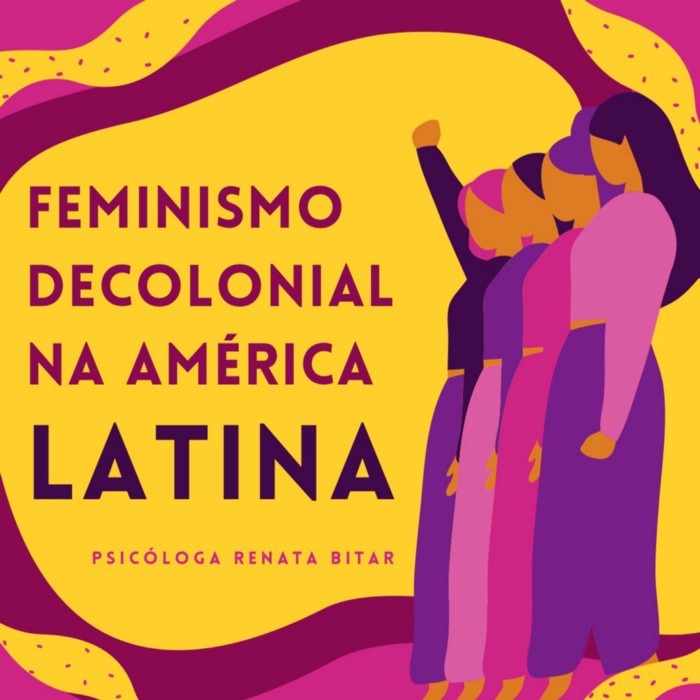by Renata Bitar
Currently, contemporary South American women are noticeable becoming sick, not only due to the distancing of their awareness of ancestry but also due to the scarcity of freedom in the social space that the patriarchal model has been eliminating over the decades.
In this context, throughout the psychotherapy process, it is possible to identify the need to help these women to connect with their deepest unconscious contents, neglected in the dialectic dynamic of their biographies and the unconscious of the community. And, not only there is an emerging movement of women searching for the primordial strength of the feminine, related to ancestral and savage women, outside the civilizing and patriarchal capitalist context, but it is also arising the feminist aspect that involves Decoloniality. Decoloniality aimed at peripheral, marginalized women by various types of prejudice, in situations of vulnerability, people outside cisheteronormativity, etc.
Decolonial feminism is based on the idealization of a feminism aimed at third world women, who represent the global fraction of those who have historically experienced the violence of colonization processes that are based on a patriarchal structure, racist domination and marked by the subjugation of the feminine.
The decolonial aspect seeks the return of the role of women who are socially marginalized and who, many times, do not feel represented by the white feminism born in Europe and which aim at issues related to women’s rights but assuming civility as a condition for inclusion. From this perspective, it is vital to understand feminism not only as a movement that focuses on gender issues but also with regard to the needs of women who are in contexts commonly outside the accessibility of the rights conquered or still pursued by European feminism.
With this, it is also understood that the female body is, in the patriarchal perspective, something to be colonized, in an attempt of objectification that has been perpetuated since primordial times, at the same time that the myth of the Goddess was reneged and its cults were eliminated by means of persecution, prohibition, and erasure.
When establishing a colonial policy, the woman who owns her colonized body and land, ends up realizing that colonization also involves gender domination, leading to even greater oppression to women, especially when there are racial, ethnic, sexual, ideological and socioeconomic boundaries. In other words, the greater the dichotomous distance, the greater the vulnerability and the further down the colonial hierarchy remains.
Post-colonialism in no way meant the end of this established inequality. On the contrary, this reality has only been reinforced with capitalist predominance, since this economic model is, precisely, based on inequality. And the tendency of the most privileged people in this patriarchal system is the continuous exclusion of peripheral populations, as social barriers and the veto of egalitarian rights are sustained.
This global condition solidifies the entire culture of scarcity. In South American territory, the marginalization of native peoples can be identified and, consequently, the ignorance and devaluation of an ancestral culture. Thus, conflicts of interest arise regarding the “appropriation” of natural resources, as if Mother Earth were owned, for example, by large landlords and businessmen, while indigenous communities are treated as invaders, and indigenous genocide remains to be invisible.
Therefore, one can make comprehensive observations on the disconnection of the myth of the Goddess, the invalidation of ancestry and the consequences that have developed throughout the history of Western civilizations, through oppression and violence against women in terms of gender, race, ethnicity, sexual orientation and geographic location.
In short, such social structure produces several impacts in the process of individuation of these women, including the loosening of the Ego – Self axis, due to all the historical deficiencies, intensified during the colonization period.

The female body and mind, her behavior and beliefs, her ability to choose, everything essential to the woman’s soul, was subjected to patriarchal dominance, to the point of dissociating her own female soul from the Goddess, generating complexes linked to the psychological forces related to the archetype of the Great Mother. Drained, the female vital force needs to be revitalized.
References
Perhaps the revival of rituals and therapies concerning the Feminine indicates the need for the collectivity of South American women to understand their oppressed and neglected roots. For some of them, experiencing such processes may suggest reconnection not only with aspects of their biographical personal unconscious, but with the complexity of values that constitute their collective soul, reviving indigenous ancestrality, which makes the journey of Individuation possible.
CAMPBELL, Joseph. Deusas: os mistérios do divino feminino. São Paulo: Palas Athena, 2016.
ÉSTES, Clarissa Pinkola. Mulheres que correm com os lobos: mitos e histórias do arquétipo da mulher selvagem. Rio de Janeiro: Rocco, 1994.
LUGONES, María. Rumo a um feminismo descolonial. Rev. Estud. Fem: Florianópolis, 2014. v.22, n.3, p.935-952. Disponível em: <http://www.scielo.br/scielo.php?script=sci_arttext&pid=S0104- 026X2014000300013&lng=en&nrm=iso>. Acesso em: 23 de setembro de 2020.
VARELA, Marisa. Iniciação Inka. Rio de Janeiro: Nova Fronteira, 1993.
